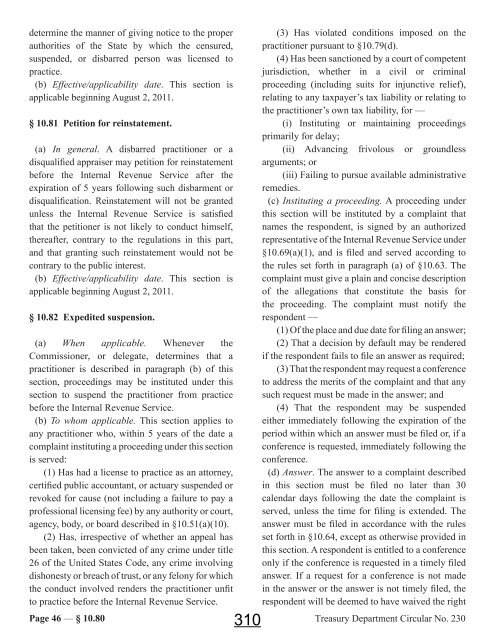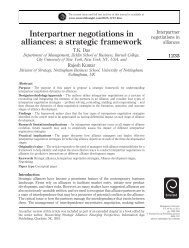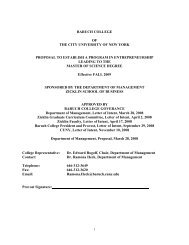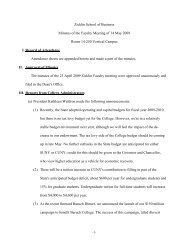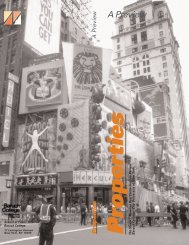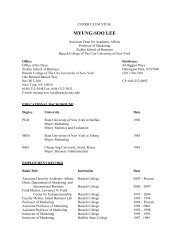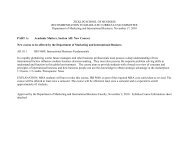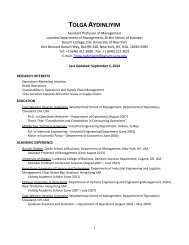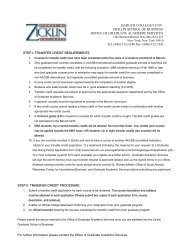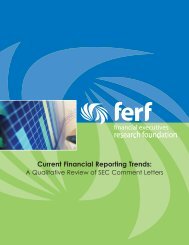Tax Seminar #3 – December 3 2012
Workbook - Zicklin School of Business
Workbook - Zicklin School of Business
Create successful ePaper yourself
Turn your PDF publications into a flip-book with our unique Google optimized e-Paper software.
determine the manner of giving notice to the proper<br />
authorities of the State by which the censured,<br />
suspended, or disbarred person was licensed to<br />
practice.<br />
(b) Effective/applicability date. This section is<br />
applicable beginning August 2, 2011.<br />
§ 10.81 Petition for reinstatement.<br />
(a) In general. A disbarred practitioner or a<br />
disqualified appraiser may petition for reinstatement<br />
before the Internal Revenue Service after the<br />
expiration of 5 years following such disbarment or<br />
disqualification. Reinstatement will not be granted<br />
unless the Internal Revenue Service is satisfied<br />
that the petitioner is not likely to conduct himself,<br />
thereafter, contrary to the regulations in this part,<br />
and that granting such reinstatement would not be<br />
contrary to the public interest.<br />
(b) Effective/applicability date. This section is<br />
applicable beginning August 2, 2011.<br />
§ 10.82 Expedited suspension.<br />
(a) When applicable. Whenever the<br />
Commissioner, or delegate, determines that a<br />
practitioner is described in paragraph (b) of this<br />
section, proceedings may be instituted under this<br />
section to suspend the practitioner from practice<br />
before the Internal Revenue Service.<br />
(b) To whom applicable. This section applies to<br />
any practitioner who, within 5 years of the date a<br />
complaint instituting a proceeding under this section<br />
is served:<br />
(1) Has had a license to practice as an attorney,<br />
certified public accountant, or actuary suspended or<br />
revoked for cause (not including a failure to pay a<br />
professional licensing fee) by any authority or court,<br />
agency, body, or board described in §10.51(a)(10).<br />
(2) Has, irrespective of whether an appeal has<br />
been taken, been convicted of any crime under title<br />
26 of the United States Code, any crime involving<br />
dishonesty or breach of trust, or any felony for which<br />
the conduct involved renders the practitioner unfit<br />
to practice before the Internal Revenue Service.<br />
Page 46 — § 10.80<br />
310<br />
(3) Has violated conditions imposed on the<br />
practitioner pursuant to §10.79(d).<br />
(4) Has been sanctioned by a court of competent<br />
jurisdiction, whether in a civil or criminal<br />
proceeding (including suits for injunctive relief),<br />
relating to any taxpayer’s tax liability or relating to<br />
the practitioner’s own tax liability, for —<br />
(i) Instituting or maintaining proceedings<br />
primarily for delay;<br />
(ii) Advancing frivolous or groundless<br />
arguments; or<br />
(iii) Failing to pursue available administrative<br />
remedies.<br />
(c) Instituting a proceeding. A proceeding under<br />
this section will be instituted by a complaint that<br />
names the respondent, is signed by an authorized<br />
representative of the Internal Revenue Service under<br />
§10.69(a)(1), and is filed and served according to<br />
the rules set forth in paragraph (a) of §10.63. The<br />
complaint must give a plain and concise description<br />
of the allegations that constitute the basis for<br />
the proceeding. The complaint must notify the<br />
respondent —<br />
(1) Of the place and due date for filing an answer;<br />
(2) That a decision by default may be rendered<br />
if the respondent fails to file an answer as required;<br />
(3) That the respondent may request a conference<br />
to address the merits of the complaint and that any<br />
such request must be made in the answer; and<br />
(4) That the respondent may be suspended<br />
either immediately following the expiration of the<br />
period within which an answer must be filed or, if a<br />
conference is requested, immediately following the<br />
conference.<br />
(d) Answer. The answer to a complaint described<br />
in this section must be filed no later than 30<br />
calendar days following the date the complaint is<br />
served, unless the time for filing is extended. The<br />
answer must be filed in accordance with the rules<br />
set forth in §10.64, except as otherwise provided in<br />
this section. A respondent is entitled to a conference<br />
only if the conference is requested in a timely filed<br />
answer. If a request for a conference is not made<br />
in the answer or the answer is not timely filed, the<br />
respondent will be deemed to have waived the right<br />
Treasury Department Circular No. 230


